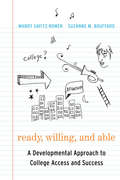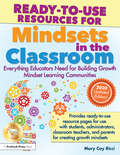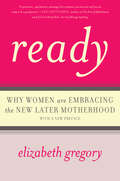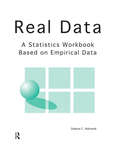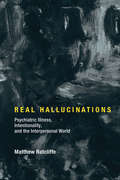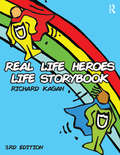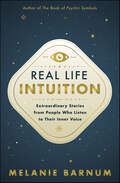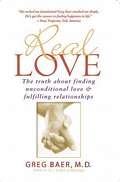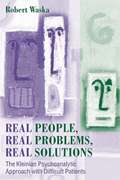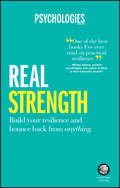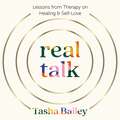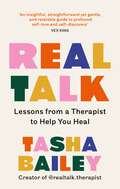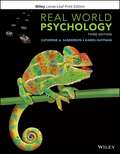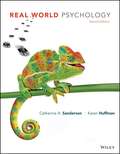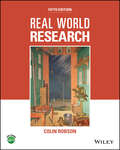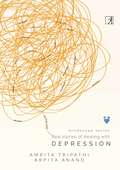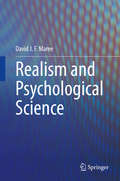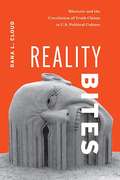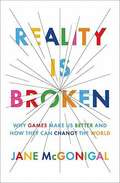- Table View
- List View
Ready, Willing, and Able: A Developmental Approach to College Access and Success
by Mandy Savitz-Romer Suzanne BouffardHow can an understanding of adolescent development inform strategies and practices for supporting first-generation college goers? In Ready, Willing, and Able, Mandy Savitz-Romer and Suzanne Bouffard focus on the developmental tasks and competencies that young people need to develop in order to plan for and succeed in higher education. These include identity development, articulating aspirations and expectations, forming and maintaining strong peer and adult relationships, motivation and goal-setting, and self-regulatory skills, such as planning. The authors challenge the predominant approach of giving young people information and leaving it to them to figure out how to apply it. They show how well-intended college-access efforts can miss the mark—for instance, by focusing on students who already see themselves as college material, rather than working to help all students develop a &“college-going identity.&” In addition, most college-access programs and practices focus almost exclusively on providing academic preparation and financial support. In Ready, Willing, and Able, Savitz-Romer and Bouffard call for a new approach: one that emphasizes the key developmental tasks and processes of adolescence and integrates them into existing college-access practices in meaningful ways. Rather than treating young people as passive recipients of services, they argue, adults can engage them as active agents in the construction of their own futures.
Ready-to-Use Resources for Mindsets in the Classroom: Everything Educators Need for Building Growth Mindset Learning Communities
by Mary Cay RicciReady-to-Use Resources for Mindsets in the Classroom provides educators with tools they need to help students change their thinking about their abilities and potential. The book features ready-to-use, interactive tools for students, teachers, parents, administrators, and professional development educators. When students believe that dedication and hard work can change their performance in school, they grow to become resilient, successful students.
Ready: Why Women Are Embracing the New Later Motherhood
by Elizabeth GregoryOver the past three decades, skyrocketing numbers of women have chosen to start their families in their late thirties and early forties. In 2005, ten times as many women had their first child between the ages of 35 and 39 as in 1975, and thirteen times as many had their first between 40 and 44. Women now have the option to define for themselves when they're ready for family, rather than sticking to a schedule set by social convention. As a society, however, we have yet to come to terms with the phenomenon of later motherhood, and women who decide it makes sense for them to delay pregnancy often find themselves confronted with alarmist warnings about the dangers of waiting too long.In Ready, Elizabeth Gregory tracks the burgeoning trend of new later motherhood and demonstrates that for many women today, waiting for family works best. She provides compelling evidence of the benefits of having children later--by birth or by adoption. Gregory reveals that large numbers of women succeed in having children between 35 and 44 by the usual means (one in seven kids born today has a mom in that age range), and that many of those who don't succeed nonetheless find alternate routes to happy families via egg donation or adoption. And they're glad they waited. Without ignoring the complexities that older women may face in their quest to have children, Gregory reveals the many advantages of waiting: Stronger family focus: Having achieved many of their personal and career goals, new later moms feel ready to focus on family rather than trying to juggle priorities More financial power: New later moms have established careers and make higher salaries Greater self-confidence: New later moms have more career experience, and their management skills translate directly into managing a household and advocating for their children More stable single-parenting: New later moms who are single have more resources High marriage rate: On average, 85 percent of new later moms are married, lending stability to the family structure Longer lives: Evidence indicates that new later moms actually live longer than moms who start their families earlier Based on in-depth interviews with more than 100 new later moms and extensive collateral research, Ready shatters the myths surrounding later motherhood. Drawing on both the statistical evidence and the voices of the new later mothers themselves, Gregory delivers surprising and welcome news that will revolutionize the way we think about motherhood.
Real Data: A Statistics Workbook Based on Empirical Data
by Zealure C Holcomb• In Real Data, students predict the answers to interesting questions. Then they analyze data supplied by leading researchers to see if there is empirical support for their predictions. • Students get practice in computing all the major statistics usually covered in an introductory statistics course. • Because each of the 35 exercises in Part A deals with only a limited number of statistics, the workbook is easily coordinated with all introductory statistics textbooks. • Part A emphasizes small data sets that are useful whether students are using calculators or computers. The exercises in this part are highly structured so students know exactly what is required of them. • Part B provides larger data sets for comprehensive analysis by computer users. Loosely structured, the data sets allow you to specify which statistics should be computed. • Sample topics: Kissing and Sexual Harassment; Basic Trust of Rape Survivors; Gambling and Stealing; Pregnancy Risk Among Adolescents Who Had Been Sexually Abused; Boys Interacting with Their Fathers; Racial Differences in Seeking Medical Assistance; Instructors’ Clothing and Student Evaluations; Students’ Attitudes Toward Math; and Physician-Assisted Suicide. • Using real data for analysis makes the traditional statistics class come alive.
Real Hallucinations: Psychiatric Illness, Intentionality, and the Interpersonal World (Philosophical Psychopathology)
by Matthew RatcliffeA philosophical account of the structure of experience and how it depends on interpersonal relations, developed through a study of auditory verbal hallucinations and thought insertion.In Real Hallucinations, Matthew Ratcliffe offers a philosophical examination of the structure of human experience, its vulnerability to disruption, and how it is shaped by relations with other people. He focuses on the seemingly simple question of how we manage to distinguish among our experiences of perceiving, remembering, imagining, and thinking. To answer this question, he first develops a detailed analysis of auditory verbal hallucinations (usually defined as hearing a voice in the absence of a speaker) and thought insertion (somehow experiencing one's own thoughts as someone else's). He shows how thought insertion and many of those experiences labeled as “hallucinations” consist of disturbances in a person's sense of being in one type of intentional state rather than another.Ratcliffe goes on to argue that such experiences occur against a backdrop of less pronounced but wider-ranging alterations in the structure of intentionality. In so doing, he considers forms of experience associated with trauma, schizophrenia, and profound grief.The overall position arrived at is that experience has an essentially temporal structure, involving patterns of anticipation and fulfillment that are specific to types of intentional states and serve to distinguish them phenomenologically. Disturbances of this structure can lead to various kinds of anomalous experience. Importantly, anticipation-fulfillment patterns are sustained, regulated, and disrupted by interpersonal experience and interaction. It follows that the integrity of human experience, including the most basic sense of self, is inseparable from how we relate to other people and to the social world as a whole.
Real Indians: Identity and the Survival of Native America
by Eva Marie GarroutteAn insightful and original analysis of the competing ways that Indian identity is defined, followed by a discussion of a new way of defining Indian-ness, which the author calls "indigenous theory."
Real Life Heroes Life Storybook: A Life Storybook For Children
by Richard KaganReal Life Heroes Life Storybook, 3rd Edition is a resourceful tool for children with traumatic stress. The resiliency-centered format and structure of the volume is coupled with treatment and sessions outlined in the Real Life Heroes Toolkit for Treating Traumatic Stress in Children and Families. This updated edition uses a creative arts approach, encouraging children to work with dependable adults to develop autobiographies through a wide range of activities, including drawings, music, movies, and narrative. By helping children feel protection from adversity and stressors that exist in everyday life, this workbook gives children a sense of value that can promote transformation of troubled children from victims into tomorrow's heroes.
Real Life Intuition: Extraordinary Stories from People Who Listen to Their Inner Voice
by Melanie BarnumTrust Your Metaphysical Senses and Master Your IntuitionFeaturing empowering and sometimes surprising experiences from real people and exercises for developing your natural gifts, this book teaches you how to use intuition to get ahead in life. Discover inspiring stories from doctors, lawyers, musicians, therapists, and other professionals who tapped into their intuition and experienced a positive life shift. Through these vignettes you will gain a deeper understanding and working knowledge of your five clairs: clairsentience, claircognizance, clairvoyance, clairaudience, and clairalience. Melanie Barnum also reveals how to interpret dreams, intuitive flashes, and signs and synchronicities. With this book, you will tune in to the universal energy that connects us all and use it to help move toward greater success and joy.
Real Love: The Truth about Finding Unconditional Love & Fulfilling Relationships
by Greg BaerWith Real Love, nothing else matters; without it, nothing else is enough. Why do most people spend their whole lives searching for loving and happy relationships but rarely find them? What is the "secret something" that all relationships need in order to thrive? Dr. Greg Baer found the answers to these questions while working with hundreds of individuals and couples. In Real Love, he shares his enlightening and practical blueprint for creating successful relationships and reveals the secret to finding and keeping what he calls "Real Love. " You'll discover: - The difference between Imitation Love, or conditional love, which most people grow up experiencing, and Real Love, the secret to genuine happiness- How to eliminate conflicts in relationships with spouses, children, parents, siblings, friends, and colleagues- How to put an end to destructive "Getting" and "Protecting" behaviors- Precisely how dishonesty, criticism, and blame-fixing can irrevocably damage relationships- How Real Love can break the cycles of expectation and disappointment and how it can ease and eradicate feelings of anger, resentment, and fear- The four steps to finding Real LoveWith Real Love as your guide, you can begin to heal the wounds of your past and create rewarding and fulfilling relationships in every area of your life.
Real Man Adventures
by T CooperA few years ago, the novelist T Cooper wrote his parents a letter telling them he "wasn't their daughter anymore." And that was the "good news."Real Man Adventures is Cooper's brash, wildly inventive, and often comic exploration of the paradoxes and pleasures of masculinity. He takes us through his transition into identifying as male, and how he went on to marry his wife and become an adoring stepfather of two children. Alternately bemused and exasperated when he feels compelled to explain all this, Cooper never loses his sense of humor. "Ten Things People Assume I Understand About Women But Actually Don't," reads one chapter title, while another proffers: "Sometimes I Think the Whole of Modern History Can Be Explained by Testosterone."A brilliant collage of letters, essays, interviews (with his brother, with his wife, with the parents of other transgender children), artwork, and sharp evocations of difficult conversations with old friends and puzzled bureaucrats, Real Man Adventures will forever change what you think about what it means to be a man.
Real Options and Investment Under Uncertainty: Classical Readings and Recent Contributions
by Eduardo S. Schwartz Lenos TrigeorgisThe study of investment under uncertainty was stagnant for several decades, until recent developments in real options provided the tools to revitalize the field. The techniques and insights derived from option pricing can now be used to quantify the elusive elements of managerial operating flexibility and strategic interactions ignored or underestimated by conventional Net Present Value and other quantitative approaches. Topics covered include the reasons for the under-investment problem and conceptual frameworks for viewing productive investment opportunities as real options; useful valuation building blocks; the quantifying of various types of real options separately and in combination; strategic aspects of investment under uncertainty; numerical analysis techniques; a variety of applications, including the valuing of natural resources, R&D and pioneer ventures, land development, strategic acquisitions, government subsidies, power plants and pollution options, flexible manufacturing, and multinational operations; and empirical evidence from oil leasing, land prices, and discontinued operations.
Real People, Real Problems, Real Solutions: The Kleinian Psychoanalytic Approach with Difficult Patients
by Robert WaskaReal People, Real Problems, Real Solutions offers a clear introduction to psychoanalytic practice from a Kleinian perspective and shows how the modern Kleinian works with the most taxing and least conforming of their patients.Illustrated by extensive case material this book:*reviews Freud's original theoretical concepts and examines Klein's contributions to the field of psychoanalysis, clarifying and comparing the two approaches in the clinical setting.*identifies and explores who makes up the psychoanalyst's most challenging case load and demonstrates how the Kleinian psychoanalytic approach is helpful to these individuals.*discusses the current state of traditional methods of training at psychoanalytic institutes, which are shown to be in need of renewal and critical restructuring.Real People, Real Problems, Real Solutions shows how the average psychoanalyst and psychotherapist face many difficult patients in a typical days work. Together with its questioning of what really constitutes psychoanalytic therapy, this is a refreshing read for all practising and training psychoanalysts and psychotherapists.
Real Strength: Build Your Resilience and Bounce Back from Anything
by Psychologies MagazineBUILD YOUR RESILIENCE What do you do when life throws a curveball? Adversity is an inescapable part of life, but it's how you deal with it that really counts. Resilience is about using those challenges, however large or small, to reset your course and create the life you want. BOUNCE BACK FROM ANYTHING Real strength is not just about surviving hard times, but thriving despite the challenges. Using the latest research and advice from experts in the field of wellbeing and resilience, Psychologies magazine will help you: Feel more confident in your ability to overcome change Tap into and build on the inner resilience you already have React in a healthy way to problems and opportunities Avoid the common pitfalls that rob you of your strength Adopt new techniques to help you start getting stronger today When life knocks you back, you need to tap into those reserves of strength and find a way to move forward again. You are strong, you are brave and you are about to take the first step.
Real Talk: Lessons From Therapy on Healing & Self-Love
by Tasha BaileyIt's time to bring therapy out of the therapy room and into the real world.In recent years, therapy and self-care have become familiar buzzwords, but it's clear that people are having to face their emotional difficulties without the tools and insight to work through them. Enter Real Talk: A book to enable readers to have genuine, authentic conversations with themselves, and to start the journey of healing their past experiences and cope with the challenges of modern life.Filled with techniques and wisdom from a therapist's toolkit this is a must-have handbook for optimising your mental health. Drawing on her experience as a qualified psychotherapist and applying her intersectional perspective Tasha Bailey shares the knowledge and skills you need to change your life.Tasha's straight-talking but compassionate style will help readers hold up a mirror to their present situation and make sense of their past - delving into topics such as:· Trauma & inner-child healing· Love, trust, and attachment· Family: intergenerational cycles of behaviour, rupture, and repair.· Self-Esteem, bodies & sexReal Talk contains a collection of lessons which the reader might typically learn in therapy. Tasha teaches readers modern language and ideas about mental health, exploring self-love and self-understanding. Connecting psychological theory, lived experience, references from modern day media and case studies from Tasha's work to create a more current, creative, and inclusive perspective of mental health.(p) 2023 Octopus Publishing Group
Real Talk: Lessons From Therapy on Healing & Self-Love
by Tasha Bailey'Real Talk is like having a kind, supportive and wise one-to-one with a great therapist.' - Abby RawlinsonIt's time to bring therapy out of the therapy room and into the real world.In recent years, therapy and self-care have become familiar buzzwords, but it's clear that people are having to face their emotional difficulties without the tools and insight to work through them. Enter Real Talk: A book to enable readers to have genuine, authentic conversations with themselves, and to start the journey of healing their past experiences and cope with the challenges of modern life.Filled with techniques and wisdom from a therapist's toolkit this is a must-have handbook for optimising your mental health. Drawing on her experience as a qualified psychotherapist and applying her intersectional perspective Tasha Bailey shares the knowledge and skills you need to change your life.Tasha's straight-talking but compassionate style will help readers hold up a mirror to their present situation and make sense of their past - delving into topics such as:· Trauma & inner-child healing· Love, trust, and attachment· Family: intergenerational cycles of behaviour, rupture, and repair.· Self-Esteem, bodies & sexReal Talk contains a collection of lessons which the reader might typically learn in therapy. Tasha teaches readers modern language and ideas about mental health, exploring self-love and self-understanding. Connecting psychological theory, lived experience, references from modern day media and case studies from Tasha's work to create a more current, creative, and inclusive perspective of mental health.
Real Talk: Lessons From Therapy on Healing & Self-Love
by Tasha Bailey'Real Talk is like having a kind, supportive and wise one-to-one with a great therapist.' - Abby RawlinsonIt's time to bring therapy out of the therapy room and into the real world.In recent years, therapy and self-care have become familiar buzzwords, but it's clear that people are having to face their emotional difficulties without the tools and insight to work through them. Enter Real Talk: A book to enable readers to have genuine, authentic conversations with themselves, and to start the journey of healing their past experiences and cope with the challenges of modern life.Filled with techniques and wisdom from a therapist's toolkit this is a must-have handbook for optimising your mental health. Drawing on her experience as a qualified psychotherapist and applying her intersectional perspective Tasha Bailey shares the knowledge and skills you need to change your life.Tasha's straight-talking but compassionate style will help readers hold up a mirror to their present situation and make sense of their past - delving into topics such as:· Trauma & inner-child healing· Love, trust, and attachment· Family: intergenerational cycles of behaviour, rupture, and repair.· Self-Esteem, bodies & sexReal Talk contains a collection of lessons which the reader might typically learn in therapy. Tasha teaches readers modern language and ideas about mental health, exploring self-love and self-understanding. Connecting psychological theory, lived experience, references from modern day media and case studies from Tasha's work to create a more current, creative, and inclusive perspective of mental health.
Real World Psychology
by Karen Huffman Catherine A. SandersonReal World Psychology balances comprehensive coverage of the key concepts in introductory psychology with a concise presentation style and engages students with current and interesting research that explores these concepts in real-life contexts. Real World Psychology features the incomparable author team of Karen Huffman (Palomar College) and Catherine Sanderson (Amherst College) who create an outstanding text that is appealing to students and instructors at a wide range of academic institutions. The new edition has been thoroughly updated and features a new focus on Scientific Thinking and Practical Applications underscoring the fact that connecting the principles of psychological science to everyday life is critical to student engagement, and ultimately key to their success – not only in the introductory psychology course, but in whatever their chosen field of study and in everyday life. Students will leave the course with an appreciation of how a basic, yet scientific understanding of human behavior can benefit them in their studies, in their personal lives, and in their professional endeavors.
Real World Psychology
by Karen Huffman Catherine Sandersonbalances comprehensive coverage of the key concepts in introductory Psychology with a concise writing style and engages students with current and interesting research that explores these concepts in real-life contexts.
Real World Research
by Colin RobsonREAL WORLD RESEARCH Provides students and practitioner alike with clear and systematic guidance on performing social research in applied settings Real World Research supplies the multidisciplinary skills necessary to conduct social research projects inside and outside of the classroom or the workplace. Offering well-balanced coverage of qualitative, quantitative, and mixed methods, this highly practical resource incorporates approaches from different social science disciplines to help readers find answers to real-life research questions in healthcare, education, business and management, and in many other public and private settings. Detailed yet accessible chapters include step-by-step advice for developing a research question, choosing a research design strategy, collecting and analyzing the data, interpreting and reporting the results, and more. The fifth edition contains timely coverage of contemporary methodologies, key ethical issues, and ongoing debates within the field of social research. New and expanded sections address topics such as evidence‐based approaches to social research, ethical considerations when conducting research involving people, carrying out projects based solely on existing research, and the importance and implications of internet-based research. Featuring a wealth of up-to-date examples drawn from a wide range of disciplines, this classic textbook: Focuses on useful real-world research in applied settings such as homes, schools, businesses, and other workplaces Provides a concise overview and a well-defined example of each main step of the research process Highlights the importance of collaboration, cooperation, and active participation in social research Explains flexible research designs using largely qualitative methods, including additional coverage of ethnographic and grounded theory approaches Includes an extensive companion website with numerous research examples, links to journal articles, PowerPoint slides, and many other additional resources Real World Research, Fifth Edition, remains essential reading for those tasked with developing, performing, and reporting the findings of a research project, including students, academics and educators, social scientists, health practitioners, and professionals in a diverse range of fields.
Real stories of dealing with Depression: Mindscape series
by Amrita Tripathi Arpita AnandDepression in urban India is something we are learning to talk about. But are we really having the conversations we need to? How will we defeat the stigma associated with mental illness in India without being completely open about some of our darkest times? And when we will learn that we are truly Not Alone in our struggle? Many have walked this path, and many have learned how to heal… though there is no one-size-fits-all solution. Ten brave first-person contributors share portions of their journey towards healing, stories that will resonate, move you and fill you with hope. Hear from mental health experts as well to find the answers to several questions: How do you know if you&’re depressed? Who should you seek out for help? And what should you say to people who claim that you should just shake off the blues?
Realism and Psychological Science
by David J. MareeThe book provides an argument why realism is a viable metatheoretical framework for psychological science. By looking at some variations of realism such as scientific realism, critical realism, situational realism and Ferraris’ new realism, a realist view of science is outlined that can feature as a metatheory for psychological science. Realism is a necessary correction for the mythical image of science responsible for and maintained by a number of dichotomies and polarities in psychology. Thus, the quantitative-qualitative dichotomy, scientist-practitioner polarity and positivist-constructionist opposition feed off and maintains a mythic image of science on levels of practice, methods and metatheory. Realism makes a clear distinction between ontology and epistemic access to reality, the latter which easily fits with softer versions of constructionism, and the former which grounds science in resistance and possibility, loosely translated as criticism. By taking science as a critical activity an issue such as the quantitative imperative looses its defining force as a hallmark of science - it provides epistemic access to certain parts of reality. In addition, essentially critical activities characteristic of various qualitative approaches may be welcomed as proper science. Academics, professionals and researchers in psychology would find value in situating their scholarly work in a realist metatheory avoiding the pitfalls of traditional methodologies and theories.
Reality Bites: Rhetoric And The Circulation Of Truth Claims In U. S. Political Culture
by Dana L. CloudFake news, alternative facts, post truth--terms all too familiar to anyone in U.S. political culture and concepts at the core of Dana L. Cloud's new book, Reality Bites, which explores truth claims in contemporary political rhetoric in the face of widespread skepticism regarding the utility, ethics, and viability of an empirical standard for political truths. Cloud observes how appeals to truth often assume--mistakenly--that it is a matter of simple representation of facts. However, since neither fact-checking nor "truthiness" can respond meaningfully to this problem, she argues for a rhetorical realism--the idea that communicators can bring knowledge from particular perspectives and experiences into the domain of common sense. <P><P> Through a series of case studies--including the PolitiFact fact-checking project, the Planned Parenthood "selling baby parts" scandal, the Chelsea Manning and Edward Snowden cases, Neil DeGrasse Tyson's Cosmos, the rhetoric of Thomas Paine and the American Revolution, and the Black Lives Matter movement--Cloud advocates for the usefulness of narrative, myth, embodiment, affect, and spectacle in creating accountability in contemporary U.S. political rhetoric. If dominant reality "bites"--in being oppressive and exploitative--it is time, Cloud argues, for those in the reality-based community to "bite back."
Reality Is Broken
by Jane McgonigalVisionary game designer Jane McGonigal reveals how we can harness the power of games to solve real-world problems and boost global happiness. More than 174 million Americans are gamers, and the average young person in the United States will spend ten thousand hours gaming by the age of twenty-one. According to world-renowned game designer Jane McGonigal, the reason for this mass exodus to virtual worlds is that videogames are increasingly fulfilling genuine human needs. In this groundbreaking exploration of the power and future of gaming, McGonigal reveals how we can use the lessons of game design to fix what is wrong with the real world. Drawing on positive psychology, cognitive science, and sociology, Reality Is Broken uncovers how game designers have hit on core truths about what makes us happy and utilized these discoveriesto astonishing effect in virtual environments. Videogames consistently provide the exhilarating rewards, stimulating challenges, and epic victories that are so often lacking in the real world. But why, McGonigal asks, should we use the power of games for escapist entertainment alone? Her research suggests that gamers are expert problem solvers and collaborators because they regularly cooperate with other players to overcome daunting virtual challenges, and she helped pioneer a fast-growing genre of games that aims to turn gameplay to socially positive ends. In Reality Is Broken, she reveals how these new alternate reality games are already improving the quality of our daily lives, fighting social problems such as depression and obesity, and addressing vital twenty-first-century challenges-and she forecasts the thrilling possibilities that lie ahead. She introduces us to games like World Without Oil, a simulation designed to brainstorm-and therefore avert- the challenges of a worldwide oil shortage, and Evoke, a game commissioned by the World Bank Institute that sends players on missions to address issues from poverty to climate change. McGonigal persuasively argues that those who continue to dismiss games will be at a major disadvantage in the coming years. Gamers, on the other hand, will be able to leverage the collaborative and motivational power of games in their own lives, communities, and businesses. Written for gamers and nongamers alike, Reality Is Broken shows us that the future will belong to those who can understand, , and play games. Watch a Video .
Reality Is Broken: Why Games Make Us Better and How They Can Change the World
by Jane McgonigalVisionary game designer Jane McGonigal reveals how we can harness the power of games to solve real-world problems and boost global happiness. More than 174 million Americans are gamers, and the average young person in the United States will spend ten thousand hours gaming by the age of twenty-one. According to world-renowned game designer Jane McGonigal, the reason for this mass exodus to virtual worlds is that videogames are increasingly fulfilling genuine human needs. In this groundbreaking exploration of the power and future of gaming, McGonigal reveals how we can use the lessons of game design to fix what is wrong with the real world.Drawing on positive psychology, cognitive science, and sociology, Reality Is Broken uncovers how game designers have hit on core truths about what makes us happy and utilized these discoveriesto astonishing effect in virtual environments. Videogames consistently provide the exhilarating rewards, stimulating challenges, and epic victories that are so often lacking in the real world. But why, McGonigal asks, should we use the power of games for escapist entertainment alone? Her research suggests that gamers are expert problem solvers and collaborators because they regularly cooperate with other players to overcome daunting virtual challenges, and she helped pioneer a fast-growing genre of games that aims to turn gameplay to socially positive ends.In Reality Is Broken, she reveals how these new alternate reality games are already improving the quality of our daily lives, fighting social problems such as depression and obesity, and addressing vital twenty-first-century challenges-and she forecasts the thrilling possibilities that lie ahead. She introduces us to games like World Without Oil, a simulation designed to brainstorm-and therefore avert- the challenges of a worldwide oil shortage, and Evoke, a game commissioned by the World Bank Institute that sends players on missions to address issues from poverty to climate change.McGonigal persuasively argues that those who continue to dismiss games will be at a major disadvantage in the coming years. Gamers, on the other hand, will be able to leverage the collaborative and motivational power of games in their own lives, communities, and businesses. Written for gamers and nongamers alike, Reality Is Broken shows us that the future will belong to those who can understand, , and play games.Watch a Video
Reality Is Broken: Why Games Make Us Better and How They Can Change the World
by Jane McgonigalA visionary game designer reveals how we can harness the power of games to boost global happiness. With 174 million gamers in the United States alone, we now live in a world where every generation will be a gamer generation. But why, Jane McGonigal asks, should games be used for escapist entertainment alone? In this groundbreaking book, she shows how we can leverage the power of games to fix what is wrong with the real world-from social problems like depression and obesity to global issues like poverty and climate change-and introduces us to cutting-edge games that are already changing the business, education, and nonprofit worlds. Written for gamers and non-gamers alike, Reality Is Broken shows that the future will belong to those who can understand, design, and play games.From the Trade Paperback edition.
